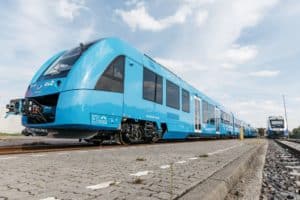
German hydrogen-powered train
Credit: René Frampe
The world’s two first hydrogen-powered trains have begun service in Germany. The trains, which operate in between northern German towns, are a step away from traditional diesel power.
According to a press release from Alstom, the trains’ French parent company, they are are “equipped with fuel cells which convert hydrogen and oxygen into electricity, thus eliminating pollutant emissions related to propulsion.” The trains, which promise a low-noise trip, can hit speeds up to 140 km/hr, or 86.9 MPH. They’ll run on 100 kilometers (62 miles) of track.
The gaseous hydrogen that will power the trains will be pumped in from a 40-foot-high steel container near the tracks at Bremervörde station. Already the endpoint of the German Ferry Road, the small town now plays a role in transitioning away from diesel. In one way or another, diesel engines have been powering trains for over a century.
Although the Coradia iLint trains, as they’re known, are running on a short track, they are […]











Most hydrogen gas is produced from hydrocarbons which is very polluting, not from a Hoffman device converting water into hydrogen and oxygen, as is demonstrated in high school chemistry.